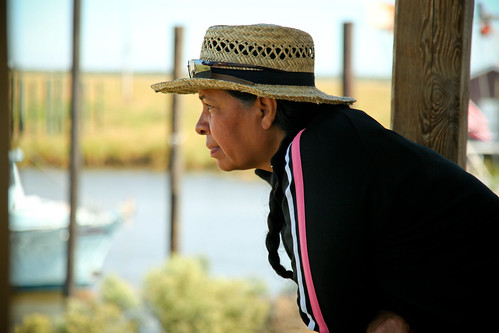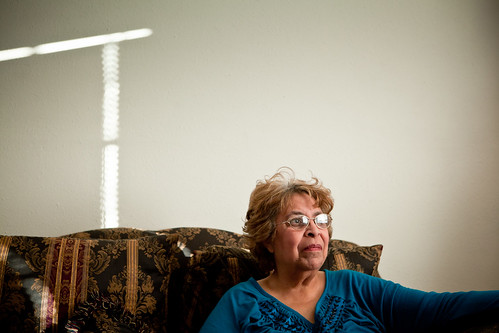In the Gulf, a native community fights the oil disaster
For a thousand years, Rosina Philippe and her aunt Geraldine Philippe's families fished and hunted in the Louisiana bayou. As members of the Atakapa-Ishak Nation, they have thrived along the lush marshes and canals of Mississippi River delta, surviving on the fertile environment that sustains and nurtures their lifestyle.
Then the BP oil disaster struck last summer, and things have never been the same.
Listen to Louisiana bayou residents Rosina and Geraldine Philippe talk about the impact of the BP oil disaster on their fishing community in the video slideshow below, the latest installment in a partnership between StoryCorps, NRDC and Bridge the Gulf--"Stories from the Gulf: Living with the BP Oil Disaster."
When the BP well began gushing millions of gallons of oil into the Gulf each day, Rosina realized her lifestyle was seriously threatened. The volcano of oil took a while to reach the bays near their small community in Grand Bayou, LA, but Rosina remembers the exact day it arrived.
Day 46 we were watching the news as everything unfolded, day after day not knowing where it was going to go. And we kept running patrols wondering when it would come in. On day 46 a member of the community was out on his boat and it came rolling into the bay, I mean tons of it, thick, orange. It was horrible and it just came in and kept coming and there was nothing to stop it. The guy that ran out there to run the patrol ran into a bunch of pelicans caught up in it, and he knew that everything it touched was going to die. And that’s just what happened.
Many also worried about BP's heavy use of chemical dispersants to try to keep the oil off the surface and from reaching shore. Geraldine she says the dispersants have just made a bad situation worse.
I think the reason why they used dispersants is because they were trying to hide it. Why not leave the oil. It will float up and pick it up, why use the chemicals...without dispersants I really believe the fish and shrimp and seafood would still be clean and the ability to harvest would be there, but with all these chemicals you do not know.
Rosina says people are still spotting oily sheen, tar balls and dispersant-like foam coming into the bays and coastal shores across the Gulf (check out this local report that just came in from Florida). Rosina doesn't trust the safety of the seafood anymore, and people in her community are starting to plant gardens to grow food from the land instead of relying on their traditional bounty of the sea.

Rosina Philippe in Grand Bayou, LA. Photo by Lisa Whiteman/NRDC

Geraldine Philippe in Grand Bayou, LA Photo by Craig Fritz
There still is great distrust over health impacts of this disaster. After the president's oil commission issued its report last week, residents from all over the gulf asked commissioners at a forum in New Orleans to improve medical assistance for people of the Gulf. Rosina says that's true in her small community as well.
There's a big crediility problem between what we're seeing and what they're saying. There's a lack of confidence and full disclosure. It seems the public interest is not a priority. I'd much rather trust the people I know here, the network of people who want to make sure people and the environment are protected.
But for all the problems and challenges ahead, Rosina and Geraldine remain resolute that they can get through this ordeal. They have heard from people all around the world, and Geraldine says they know they're not fighting this alone.
I believe Grand Bayou is going to survive the oil spills and all the other stuff that happened because someone cares, somebody wants to hear about life on the bayou, pass our stories, our lives on...and let them know that life on the bayou is a wonderful life.
To see NRDC's video of the Philippe family and their lifestyle in Grand Bayou, check out this blog from last June.
